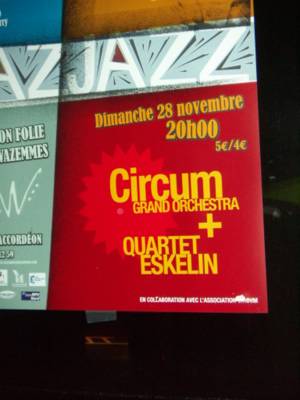Ellery Eskelin Quartet - 28/11/2004, Lille

Everything went off without a hitch, incredibly: getting to Lille, finding the venue without getting lost, meeting up with Ellery, doing the interview, being fed (an unexpected bonus!), seeing the concert. The only slight downside was that I had to leave at intermission and therefore didn't get to see the second part of the bill, the Circum Grand Orchèstre.
The concert itself was extraordinary (the interview went well - I think I'm getting better as an interviewer, at least in terms of listening to the interviewee). The Eskelin band is now comprised of the original members (Andrea Parkins on accordion, keyboard and sampler, Jim Black on drums 'n' stuff) plus vocalist Jessica Constable, an English singer living in Paris. She used to be a special guest, but is now a full-fledged member. There are a few excerpts on the DVD of her with the band, which I liked well enough but now seem very embryonic, or at least unrepresentative, compared to what I saw and heard last night.
Talking with Ellery, he made it fairly clear that he felt that, as a trio, the band has pretty much covered what he had imagined for it and that new directions were opening with the punctual or permanent adjunction of other musicians. Personally, having several trio CDs and having heard it twice before, I considered its music very consistent. Ellery's talk of how the band changes when its constitution changes and how he views singers as totally equal with instrumentalists isn't mere talk: it was clearly on display on stage, to wonderful and surprising effect.
The concert started with (natch) just the trio playing a piece from Kulak 29 + 30, I believe. Each player took unaccompanied solos, each one bookendend by a group rendition of the songs strident theme. Then came the fantastic "It's A Samba" from the equally fantastic Arcanum Moderne (the repertoire seemed more wide-ranging than the other times I've seen the group, as they tended to stick with the then-current album's repertoire, with only a few deviations). "It's A Samba" revolves around a vintage Jim Black dirty groove in a - you guessed it - more-or-less samba style.
Was it Eugene Chadbourne who referred to this group as "The Beatles of the avant-garde"? Songs like this one are the reason why: there's a catchy tune, you can dance or mosh to it and, when Ellery locked on to a one note honk (perhaps a witty pun on "One Note Samba"?), its funk-drenched energy simply carries you away.
Jessica Constable came out and launched into a Celtic-sounding long-note lament over rising keyboard drones. I guess the facile comparaison for Constable would be with a more avant Bjork. While at times I did feel that they had a similar sense of dramatic construction, they're rather different. Constable doesn't have any childishness in her voice, for example, but I'm lacking reference points.
Drums and tenor joined in, keeping the slow, pensive atmosphere. This isn't a band you'd expect to have a singer in the first place, so, as you can imagine, Constable didn't fulfill the traditional jazz singer role. I think she sang pretty much the whole time she was on stage, truly equal to the other three musicians next to her. I'm pretty sure that she sang a lot of actual lyrics, but the only word I understood the whole night was "grandmother." Somehow, in this context the indecipherable lyrics thing made a lot of sense. For this song, Ellery expanded upon the traditional singer + obbligato format, but was only just in the background. The saxophone matched up to the voice with great sensitivity, and sometimes the singer took it upon herself to match the saxophone, to surprisingly good results.
Ellery's latest album, Ten is totally improvised, but the addition of a singer seems to have sparked a different way of writing or arranging, as the next piece had a lot of sharply delimited and controlled elements. It started quietly, with a few plinked piano chords, Black scraping his cymbals and Ellery musing quietly while Constable sang a fractured and delicate line, creating a rather enchanting (in the magical sense) whole. Then, tenor and drums hooked up to drop short, sharp and loud percussive blasts in tight unison, as voice and piano (Parkins had moved to the grand set up for the big band that was to follow) continued on as before. Come to think of it, it was kind of a boys vs. girls thing.
"For No Good Reason" started in chaos, with wild sampler whistles and crackles, drums flailing, saxophone blowing freely and voice scrambling itself through an effects pad (which Constable used well throughout). A couple of keyboard notes hinted at what was to come and suddenly those gorgeous, voluptous even, chords fully emerged, bringing order, as Constable added a bluesy twist, which Ellery complemented with some soulful lines. They erupted again into a great bit of skronk + beats + menacing, and still incomprehensible, spoken word, and when those chords returned for the finale, the music soared to a veritable apotheosis. At this point I wondered, believe it or not, if this new band was not even better than the old one.
The last two tunes before the encore were on the dancier side. The first one was slow and funky, reggae-ish even, when the stabs of Parkins's keyboard vamp focused on the off-beats. The groove's even-pacedness gave it a blissful tension.
Listening to Ten for the first time as I write this, with its different and changing line-up, it doesn't represent what the quartet sounds like, but I expect that the next album will document it. At least, I hope so!
|